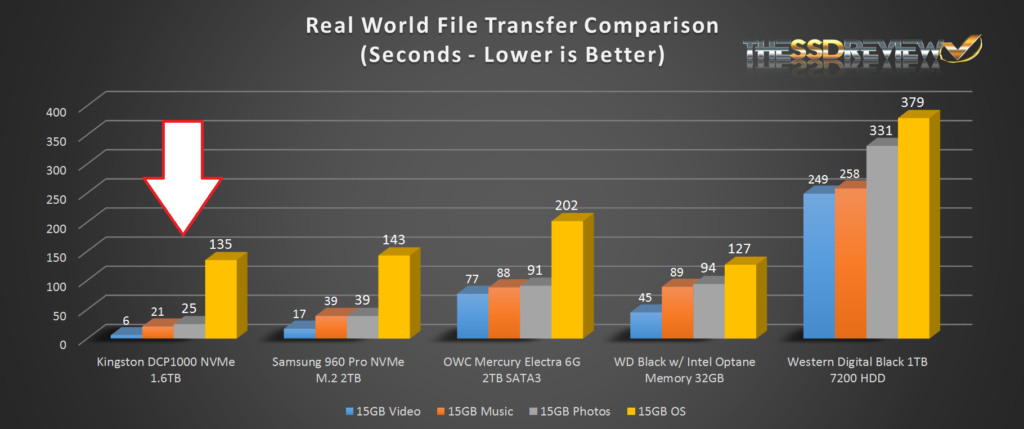REAL WORLD FILE TRANSFER COMPARISON
For our file transfer comparison consisted of the Kingston DC1000 1.6TB NVMe Data Center SSD, Samsung 960 Pro 2TB NVMe M.2 SSD, OWC Mercury Electra 2TB SATA 3 SSD, newest Intel Optane System with HDD, and a WD Black 7200RPM HDD. Our data samples consisted of 15GB folders of video, music, photos and operating system and all movement was simply copying from one folder to another on the drive.
The Kingston DCP1000 1.6TB NVMe SSD performed as expected and then some. OS files remain as hard to transfer at higher speeds as they have always been but look at the 6 seconds transfer time for 15GB of movie files. Fastest we have seen yet…
IOMETER BENCHMARK VER. 1.1.0
Last but not least, we simply wanted to try to achieve listed specifications for the Kingston DCP1000 NVMe SSD using IOMeter. These aren’t steady state results and nothing more than an effort to confirm that we could reach that 1mil IOP mark. The tests are in RAID 0, sample file size of 70GB, 4 workers at 128 outstanding IOs per. Our ‘4 Corners’ Test consists of 4k 100% random read and write, as well as 128K sequential read and write. Enjoy!
READ THROUGHPUT
WRITE THROUGHPUT
READ IOPS
WRITE IOPS
REPORT SUMMARY AND FINAL THOUGHTS
I would like to reiterate once more that this report was nothing more than a kid with his new bike for a few hours before it is put away for the winter. These tests in no way reflect on the environment or testing that this drive was envisioned for, that being data center use where such extreme throughput might benefit end user needs. Having said that, I still find it absolutely amazing that the Kingston DCP1000 1.6TB NVMe SSD could produce up to 1 million IOPS and over 7GB/s throughput in a single HHHL add in card design. This is a storage guys fix, that being said as I am rather hesitant using the term ‘storage porn’.
Stay tuned as Sean Webster follows up with his enterprise report that will show you what the Kingston DCP1000 is truly capable of in the near future. Thanks much to Kingston for sending this out for our testing and apologize if we crossed any lines disassembling the DCP1000. Great job Kingston and Liqid!
 The SSD Review The Worlds Dedicated SSD Education and Review Resource |
The SSD Review The Worlds Dedicated SSD Education and Review Resource | 


As expected, the Kingston DCP1000 is an absurdly powerful PCI-e SSD, especially when it comes to Real World File Transfers. It’s only caveat for me, being that all 4 M.2 SSD’s cannot be configured as a boot volume.
Yes… but imagine going the 1/3 route where the first SSD is still pushing over 2GB/s while the remaining three have to be reaching above 5GB/s. I should have tested this specifically but never had the idea until it was shipped off for our enterprise testing.
Les, maybe if you had an Intel DC P3700 on hand, you could’ve done some File Copy tests with the Kingston DCP1000
Yes that would have been possible but comparing any similar enterprise storage resource in a simple file transfer test isn’t really a fair proposition. It is like putting it beside the P4800x and forming opinion on file transfer where the DCP1000 would destroy the P4800…. until of course they are put side by side in true server settings and that P4800 has no settling whatsoever for steadystate.
You’re linking to an old AS SSD https://www.guru3d.com/files-details/as-ssd-benchmark.html is the new one idk about the other softwares you’re linking to!
I’d be curious how the PCIe host card performed with several other M.2 drives installed. This would be a quick and dirty way to get four Samsung 960 Pro’s into a system.
Also curious how it would have handled a single 4x PCIe 3.0 based M.2 drive when put into an older system with an 8x PCIe 2.0 slot. That’d be one way to provide more bandwidth to an older system.